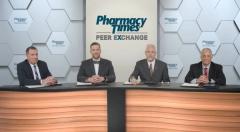
Addressing Vaccine Hesitancy
Randy McDonough, PharmD, MS, BCGP, BCPS, FAPhA, discusses his experience with vaccine hesitancy and factors that may lead to it.
Episodes in this series

Rodney E. Rohde, PhD, MS, SM (ASCP) CM, SVCM, MBCM, FACSc: This brings us to something we’re all familiar with, and that’s the idea of addressing barriers. When we talk about barriers, we’re talking specifically today about vaccine hesitancy. We’ll start with you, [Dr McDonough]. Routine vaccination is obviously essential to preventive care for people of all ages. Talk to me a little bit about your experience with vaccine hesitancy, maybe at the community level, and some of the factors you think lead to that issue. It’s a big topic.
Randy McDonough, PharmD, MS, BCGP, BCPS, FAPhA: It is a big topic, and I think COVID-19 complicated it even more because people started hearing things on social media [like] conspiracy theories and everything else. So there was even more hesitancy there. As I mentioned earlier, we do have patients who come to our practice [who are] not hesitant. That’s why they’re coming to us. Before this presentation, I went and looked at what our vaccination rate is in Johnson County. We’re a university town, got the University of Iowa, educated [residents], so you would think it must be high. You’re thinking 75%. Maybe that was thinking too high, but we’re at 45% in Johnson County, where it’s very educated. Across the state, we’re at 35% as far as vaccination rates. That just blows my mind because Iowa is an older state, with older patients. There’s a lot of hesitancy. We’re missing people now, whether it’s because we’re not meeting people where they’re at [or because we need to educate] them. What I hear or see when I do talk to patients who haven’t got a vaccine, and some of them might be my family members, is [the idea that] “I don’t need it. I’m healthy, I don’t need it.” So I talk to them about the importance that maybe it’s not you [being protected] necessarily, but you may be protecting the people around you. When my mom got really sick, I made sure everybody had a flu shot and said, “You’re not going to be able to see her if you don’t get a flu shot.” I think with COVID-19, there’s a lack of trust. We talked about mandates and things like that, and that’s new in this country because as I talked to you [about] earlier, to get into a school system, you had to be vaccinated. And I tell people that’s not really new either. And yes, I do believe in choice, but you should make the right choice there and get a vaccine. I think there’s a lack of trust and then there’s just not being knowledgeable enough. I think that’s where the community or pharmacists and other health care providers need to take that time to educate their patients and talk to them about the risks and not just their own personal risk factors, but the risk they may be giving to someone. Because you could be the carrier of it and give someone an infection that could just take that reserve away, and who knows what can happen? So giving them that education. What we try to do at Towncrest Pharmacy is do a full public campaign when flu season hits, and we’re trying to get patients who normally wouldn’t come in to come in. But we’re working with, as I said, the Johnson County Public Health Department. We’re working with some of the patient support groups and saying, what can we do to try to reach out to some of these patients? We otherwise wouldn’t have access to see if we can improve those rates. So, we’re very dedicated to seeing if we can get those rates up beyond 45% in Johnson County.
Rodney E. Rohde, PhD, MS, SM (ASCP) CM, SVCM, MBCM, FACSc: It’s a global problem. It’s definitely a United States problem. I know my experience has been as we talked about earlier, it’s coming back to that conversation. One of the things I learned during the pandemic specifically and, again, I’ve been doing this for 30 years from an infectious disease side, talking to people, having that conversation when you have the moment about what their fear is, [asking] “what is your fear?” Instead of coming at them with 8 studies, and all the letters behind my name, that just doesn’t make the connection. All of that’s important, and I eventually get back to that. But at some level, you almost have to just find the time to have a conversation.
Transcript edited for clarity.
Newsletter
Stay informed on drug updates, treatment guidelines, and pharmacy practice trends—subscribe to Pharmacy Times for weekly clinical insights.






















